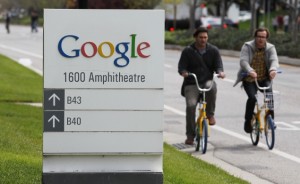 A Google Inc commuter bus was blocked in San Francisco’s Mission district for about a half hour Monday morning, highlighting many residents’ growing concern that an influx of affluent technology workers is driving up costs in the city.
A Google Inc commuter bus was blocked in San Francisco’s Mission district for about a half hour Monday morning, highlighting many residents’ growing concern that an influx of affluent technology workers is driving up costs in the city.
“San Francisco, not for sale” and “Stop evictions now” numbered among the slogans yellow-vested protesters chanted as they surrounded the double-decker bus. Google’s offices are in Mountain View, about 34 miles (55 km) away from the incident.
The protest, organized by an advocacy group called Heart of the City, took aim at private commuter buses which whisk thousands of employees from stops around San Francisco to jobs at technology companies south of the city such as Apple Inc, Facebook Inc and Google.
Advocates of the buses say they ease traffic on already clogged highways as workers give up driving individual cars for the convenience of riding in the buses, which usually come with plush seats and Wi-Fi.
Foes say the buses jam up municipal bus stops and remove potential customers from cash-strapped public transportation systems, including regional rail service, that could use their revenue.
The San Francisco Municipal Transportation Agency is proposing a set of rules around commuter buses and the use of public bus stops, a spokesman Paul Rose said via email.
“The proposed policy balances the need to minimize impacts on Muni with the benefits that shuttles provide by taking thousands of cars off the street,” Rose said. The agency plans to present the proposal to its board in January. If approved, a pilot test will go into effect in the summer, he added.
“We certainly don’t want to cause any inconvenience to San Francisco residents and we and others in our industry are working with SFMTA to agree on a policy on shuttles in the city,” a Google spokeswoman said.
Bemused Google workers spent about a half hour sitting on the bus until the protesters disbanded, many of the workers sending Tweets about the incident.
“My shuttle came under siege this morning,” tweeted Alejandro Villarreal, who attached a photo of the scene as it appeared through the bus window. Villarreal’s LinkedIn profile identifies him as a program manager at Google.
“Don’t hate on me for my job,” tweeted @FashionistaLab, whose Twitter description identifies her as a style editor at Google Shopping. “You think I LIKE commuting to Mountain View? This protest is dumb.”
A man who screamed at protest organizer Erin McElroy, 31, was later identified as a union worker who was pretending to be a Google employee upset at being delayed by the protest.
Increasingly, graffiti has appeared around town complaining about the buses.
“Google scum,” read one notice pasted to a light controller at the corner of South Van Ness Street, a major artery for the commuter buses, photographed by local resident George Lipp on Sunday. “Keep catching your bus,” read a notice on the other side of the light controller.
The commuter-bus situation “has become very symbolic of what’s happening to the city in terms of gentrification,” said McElroy in a phone interview. “It’s creating a system where San Francisco is being flooded with capital, and creating a technology class where other people can’t compete.”
Heart of the City is planning a demonstration on Tuesday against a developer that plans to evict residents from rent-controlled apartments, she added. The total number of evictions jumped 25 percent to 1,716 in the 12 months ending in February 2013, according to a report by San Francisco’s budget and legislative analyst, despite strong tenant-protection laws.
San Francisco protests against gentrification and evictions have occurred with growing frequency in recent months.
Last month, message service Twitter’s IPO sparked a demonstration outside its headquarters.
Many residents feel left out of the technology boom and blame it for rising rents.
The median rent on a two-bedroom apartment rose 10 percent over the last year to $3,250, more than any other city in the country, according to online real estate company Trulia. Rents in greater New York rose just 2.8 percent
The current situation evokes the late 1990s, when a slew of small Web start-ups popped up throughout the city, causing tensions over rising rents and traffic.
Source-NDTV





